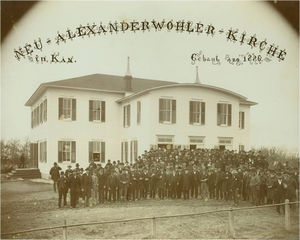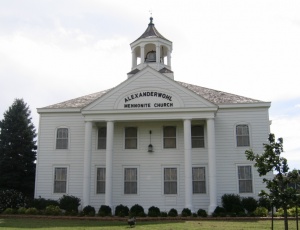Difference between revisions of "Alexanderwohl Mennonite Church (Goessel, Kansas, USA)"
| [checked revision] | [checked revision] |
m (Text replace - "<em> </em>" to " ") |
m (Forced table of contents to top of page.) |
||
| (2 intermediate revisions by the same user not shown) | |||
| Line 1: | Line 1: | ||
| + | __FORCETOC__ | ||
| + | __TOC__ | ||
[[File:Alexanderwohl1886Building.jpg|300px|thumb|''Alexanderwohl Mennonite Church, 1886.<br /> | [[File:Alexanderwohl1886Building.jpg|300px|thumb|''Alexanderwohl Mennonite Church, 1886.<br /> | ||
Source: [http://www.alexanderwohl.org/history.html Alexanderwohl Mennonite Church website].'']] | Source: [http://www.alexanderwohl.org/history.html Alexanderwohl Mennonite Church website].'']] | ||
| Line 17: | Line 19: | ||
In addition to public schools, the Alexanderwohl community had a number of parochial schools, outstanding among which were the Emmethal School and the school of [[Balzer, Peter (1847-1909)|Peter Balzer]]. Gradually the parochial schools disappeared. In 1906 the [[Goessel Preparatory School (Goessel, Kansas, USA)|Goessel Preparatory School]] was started with Peter P. Buller, who taught the school for eighteen years, as its first principal. Later the present Goessel High School, a state school, replaced this school. Before the end of the nineteenth century the [[Bethesda Hospital (Goessel, Kansas, USA)|Bethesda Hospital]] and the [[Bethesda Home (Goessel, Kansas, USA)|Bethesda Home for the Aged]] were organized at Goessel. | In addition to public schools, the Alexanderwohl community had a number of parochial schools, outstanding among which were the Emmethal School and the school of [[Balzer, Peter (1847-1909)|Peter Balzer]]. Gradually the parochial schools disappeared. In 1906 the [[Goessel Preparatory School (Goessel, Kansas, USA)|Goessel Preparatory School]] was started with Peter P. Buller, who taught the school for eighteen years, as its first principal. Later the present Goessel High School, a state school, replaced this school. Before the end of the nineteenth century the [[Bethesda Hospital (Goessel, Kansas, USA)|Bethesda Hospital]] and the [[Bethesda Home (Goessel, Kansas, USA)|Bethesda Home for the Aged]] were organized at Goessel. | ||
| − | As late as the mid-20th century, most of the Alexanderwohl members were farmers raising wheat and other small grain. A few businesses, shops, stores and a cooperative are located in Goessel | + | As late as the mid-20th century, most of the Alexanderwohl members were farmers raising wheat and other small grain. A few businesses, shops, stores and a cooperative are located in Goessel. Although High German is seldom heard and English has become predominant, Low German was still common in the homes and in social intercourse well into the twentieth century. Some of the Mennonite qualities of the old country have been better preserved in the Alexanderwohl community than elsewhere. |
Until after World War I all services of the congregation were conducted in the German language. By the end of World War II only an occasional German service was held. Feet washing in connection with the observance of the Lord's Supper was practiced until 1950. The silent kneeling prayer of the congregation at the close of the worship service, traditional in Alexanderwohl, was discontinued early in the twentieth century. It was at this time that the organ was introduced into the worship service, causing the gradual discontinuation of the <em>Vorsänger </em>system. The congregation maintains a church library and has the usual organizations, such as young people's, women's mission societies, Sunday school, etc. | Until after World War I all services of the congregation were conducted in the German language. By the end of World War II only an occasional German service was held. Feet washing in connection with the observance of the Lord's Supper was practiced until 1950. The silent kneeling prayer of the congregation at the close of the worship service, traditional in Alexanderwohl, was discontinued early in the twentieth century. It was at this time that the organ was introduced into the worship service, causing the gradual discontinuation of the <em>Vorsänger </em>system. The congregation maintains a church library and has the usual organizations, such as young people's, women's mission societies, Sunday school, etc. | ||
| Line 38: | Line 40: | ||
<strong>Website</strong>: [http://www.alexanderwohl.org/ Alexanderwohl Mennonite Church] | <strong>Website</strong>: [http://www.alexanderwohl.org/ Alexanderwohl Mennonite Church] | ||
| + | = Map = | ||
| + | [[Map:Alexanderwohl Mennonite Church, Goessel, Kansas|Map:Alexanderwohl Mennonite Church, Goessel, Kansas]] | ||
{{GAMEO_footer|hp=Vol. 1, pp. 48-50|date=1955|a1_last=Krahn|a1_first=Cornelius|a2_last=|a2_first=}} | {{GAMEO_footer|hp=Vol. 1, pp. 48-50|date=1955|a1_last=Krahn|a1_first=Cornelius|a2_last=|a2_first=}} | ||
Revision as of 23:47, 15 September 2014
When in the 1870s a new conscription law was in preparation in Russia, the Alexanderwohl Mennonite Church became the center of conferences and migration activities. Its elder Jakob Buller served as delegate to both St. Petersburg and America. Upon his return from his inspection trip to America in 1873, almost the entire village and congregation emigrated with him. This is the only case in the Old Colony and Molotschna settlements where an entire village left as a unit. The Alexanderwohl congregation had some members outside its own village. These and some others that joined them left Alexanderwohl 20 July 1874, crossing the ocean on the S.S. Cimbria and S.S. Teutonia. The Cimbria left Hamburg on 31 July 1874 with 303 adults and 172 children, and with Jakob Buller as their leader. After arriving in New York on 15 August, the group proceeded to Lincoln, Nebraska, arriving 22 August. From Lincoln they went to Topeka, Kansas. In that state their leaders purchased thirty-four sections of land north of Newton in Marion and McPherson counties at an average of $2.50 per acre in cash.
Until homes were built the group lived in an immigration house located on section 33 in Menno Township. Following the pattern to which they had been accustomed in Russia, they established the villages of Grünfeld, Emmethal, Gnadenthal, Gnadenfeld, Blumenfeld, Blumenort, Springfield, Schoenthal, and Steinbach. Gradually the village pattern was abandoned and each family moved onto its own land. Remnants of some villages can still be recognized.
Dietrich Gaeddert, leader of a group of 203 adults and 104 children, arrived in New York on the Teutonia, 15 August 1874. This group, composed of the remainder of the Alexanderwohl congregation and a few others, settled twenty miles west of Alexanderwohl north of present-day Buhler, Kansas, and organized the Hoffnungsau Mennonite Church. The present Buhler and Inman Mennonite churches are daughter congregations of Hoffnungsau.
Jakob Buller's group organized the Neu-Alexanderwohl Church in 1874 with 265 members (the "Neu" was soon dropped). By 1880 the membership had increased to 467 partly through the reception of young members but also through the addition of new immigrants. During the first years the congregation worshiped in the immigration house and in some of the schools in the various villages. In 1878 the congregation joined the General Conference Mennonite Church and in 1886, it erected a large meetinghouse one-and-a-half miles northeast of present-day Goessel, which has been enlarged and remodeled several times. In 1908, when the congregation had grown to a membership of 884, the Tabor Mennonite Church, located five miles southeast of the mother church, was organized with some 150 members. P. H. Richert was its first elder. Again in 1920 when the Alexanderwohl membership had reached 958, the Goessel Mennonite Church, located in Goessel, was organized with about 180 members, Peter P. Buller serving as the first elder. The spread of the community to the north caused the organization of the Lehigh Mennonite Church; the spread to the east, the Walton and Burns Mennonite congregations. Families from the Alexanderwohl community moving to western Kansas organized the Meadow Mennonite Church. The present Alexanderwohl community extends from Newton thirty miles north to Hillsboro and Lehigh and more than fifteen miles from east to west, making it the largest compact Mennonite settlement in Kansas. In 2006 the membership of the Alexanderwohl Mennonite Church was 600 and the combined membership of the daughter congregations was about 1,400, making a total of about 2,000.
The following ministers in addition to the elders have served the Alexanderwohl congregation: Peter Voth, Peter H. Unruh, Heinrich Richert, Heinrich Goertz, Jakob Richert, Heinrich Banman, Peter Pankratz, C. P. Wedel, C. C. Wedel, T. R. Voth, and A. J. Banman. Cornelius H. Wedel, the first president of Bethel College, came from the Alexanderwohl church.
In addition to public schools, the Alexanderwohl community had a number of parochial schools, outstanding among which were the Emmethal School and the school of Peter Balzer. Gradually the parochial schools disappeared. In 1906 the Goessel Preparatory School was started with Peter P. Buller, who taught the school for eighteen years, as its first principal. Later the present Goessel High School, a state school, replaced this school. Before the end of the nineteenth century the Bethesda Hospital and the Bethesda Home for the Aged were organized at Goessel.
As late as the mid-20th century, most of the Alexanderwohl members were farmers raising wheat and other small grain. A few businesses, shops, stores and a cooperative are located in Goessel. Although High German is seldom heard and English has become predominant, Low German was still common in the homes and in social intercourse well into the twentieth century. Some of the Mennonite qualities of the old country have been better preserved in the Alexanderwohl community than elsewhere.
Until after World War I all services of the congregation were conducted in the German language. By the end of World War II only an occasional German service was held. Feet washing in connection with the observance of the Lord's Supper was practiced until 1950. The silent kneeling prayer of the congregation at the close of the worship service, traditional in Alexanderwohl, was discontinued early in the twentieth century. It was at this time that the organ was introduced into the worship service, causing the gradual discontinuation of the Vorsänger system. The congregation maintains a church library and has the usual organizations, such as young people's, women's mission societies, Sunday school, etc.
Bibliography
Alexanderwohl Church Record.
Banman, H. "Geschichte der Alexanderwohler Mennoniten-Gemeinde bei Goessel, Kansas." Bundesbote-Kalendar (1926).
Dyck, A. J. “Hoffnungsau in Kansas.” Mennonite Life (October 1949): 18-19, 46.
From the Steppes to the Prairies, edited by Cornelius Krahn. Newton, KS: Mennonite Publication Office, 1949.
Hege, Christian and Christian Neff. Mennonitisches Lexikon, 4 vols. Frankfurt & Weierhof: Hege; Karlsruhe: Schneider, 1913-1967: v. I, 25.
Unruh, Benjamin H. "Die Mennoniten in der Neu-Mark." Gemeinde-Kalendar (1941).
Additional Information
Address: P.O. Box 8, 1304 K-15 Hwy, Goessel, KS 67053
Telephone: 620-367-8192
Website: Alexanderwohl Mennonite Church
Map
Map:Alexanderwohl Mennonite Church, Goessel, Kansas
| Author(s) | Cornelius Krahn |
|---|---|
| Date Published | 1955 |
Cite This Article
MLA style
Krahn, Cornelius. "Alexanderwohl Mennonite Church (Goessel, Kansas, USA)." Global Anabaptist Mennonite Encyclopedia Online. 1955. Web. 16 Apr 2024. https://gameo.org/index.php?title=Alexanderwohl_Mennonite_Church_(Goessel,_Kansas,_USA)&oldid=124680.
APA style
Krahn, Cornelius. (1955). Alexanderwohl Mennonite Church (Goessel, Kansas, USA). Global Anabaptist Mennonite Encyclopedia Online. Retrieved 16 April 2024, from https://gameo.org/index.php?title=Alexanderwohl_Mennonite_Church_(Goessel,_Kansas,_USA)&oldid=124680.
Adapted by permission of Herald Press, Harrisonburg, Virginia, from Mennonite Encyclopedia, Vol. 1, pp. 48-50. All rights reserved.
©1996-2024 by the Global Anabaptist Mennonite Encyclopedia Online. All rights reserved.


